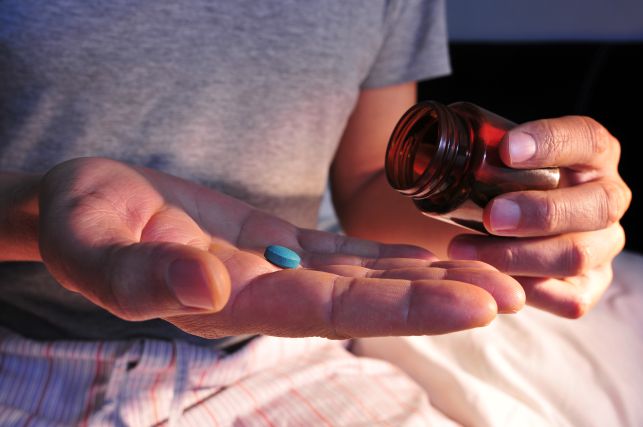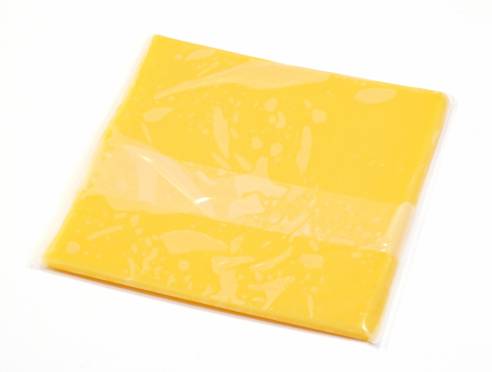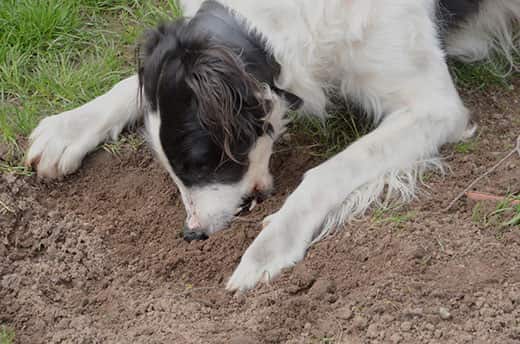These days, many of us take prescription and over-the- counter medications. But what happens if we have a dog and accidentally drop a pill? This can happen with any type of medication, including Viagra. In fact, there are stories online of dogs that found a container of the pills and decided to eat a few.
Connect with a verified veterinarian in minutes. Licensed vets are available 24/7 to answer your questions. No need to worry about your furry family member.

What is Viagra?
Viagra is a drug used to help human males with ED (erectile dysfunction). The medication is a vasodilator, which means it increases blood flow by dilating blood vessels. It’s approved for use in human males 18 years and older. These pills contain a substance that’s called sildenafil. Sildenafil is sometimes prescribed for dogs, too, but for different reasons.
In veterinary practice, sildenafil is used to treat dogs that have pulmonary hypertension. This is a type of high blood pressure that affects arteries and capillaries in the lungs. Pulmonary hypertension can be caused by any type of heart or lung disease, or sometimes even kidneyHow disease or other illnesses.
The dose usually prescribed for dogs is between 0.5 to 3 mg per kilo of body weight, given every 8 to 24 hours.
Sildenafil at Higher Doses in Dogs is a Problem
Your dog could suffer some ill effects from taking an overdose of Viagra, depending on how much of the medication he’s eaten. Possible side effects can include:
- Vomiting
- Diarrhea
- Nausea
- Lethargy
- Dizziness
- Breathing difficulties
- Nasal discharge
- Skin flushing (turning a reddish color)
If you suspect your fur baby has eaten Viagra tablets, then you’ll need to call the vet as soon as possible.

Review symptoms, medications & behavior to keep your pets healthy with a Vet Online in just minutes.
Ask a Vet Live NowDiagnosis & Treatment of Overdose of Viagra in Dogs
The vet will ask you some questions such as, how long ago your dog ate the tablets, how many pills did he eat, and what size of pills he ate.
If your dog has recently eaten the pills, then the vet may try to induce vomiting to get the medication out of your dog’s system. However, if the tablets were eaten more than a few hours ago, your dog may need to be hospitalized for further treatment.
If this is the case, the vet may decide to give your dog intravenous (IV) fluids, and monitor his cardiovascular function. This means monitoring your dog’s heart rate and blood pressure; the vet may also use an electrocardiogram (ECG) to monitor your canine companion’s heart function.
We’re happy to let you know that the prognosis is very good for dogs that receive prompt medical treatment after eating Viagra pills.
Prevent Accidental Viagra Ingestion in Dogs
You may be surprised to learn that Viagra ingestion is a common problem in dogs (and other pets). However, accidental ingestion can usually be presented.
Here are some tips to keep your dog from eating Viagra and other medications:
Keep medications stored safely: all medications, including your fur baby’s, should be stored out of your dog’s reach. You may need to store medications in a high cabinet that’s kept locked at all times. This will help keep the Viagra and other meds out of your dog’s reach.
Pick up dropped pills: it’s common to drop a pill (especially if it’s small). Some people may not believe their dog will eat this; however, dogs are curious and may eat anything they think is food. So, if you drop a pill, immediately pick it up. If you can’t find it, look for it and vacuum the area thoroughly to keep your dog from eating it.
Pill containers: some pet parents may use daily or weekly pill containers for their medications. If you use these, keep them out of your dog’s reach.
Don’t leave pills where your dog can find them: when traveling, some pet parents may keep Viagra and other medications stored in plastic baggies and bottles in their suitcases, backpacks, purses, and more. These can be easily accessed by dogs (and other pets). Keep all bags closed and locked or stored high in a closet (with the door shut) to keep your dog out.
Safe storage can go a long way to keeping your dog from accessing Viagra and other medications. You’ll keep your fur baby safe and healthy by ensuring he can’t eat your medications.
Connect with a verified veterinarian in minutes. Licensed vets are available 24/7 to answer your questions. No need to worry about your furry family member.

Gemma Cliffin BSC BVSC MRCVS
This article has been reviewed and approved by an independent Veterinarian: Dr Gemma Cliffin MRCVS is an experienced small animal vet who combines her love of writing alongside working in practice. Since her graduation from the University of Liverpool in 2014 she has worked in a wide variety of roles including first opinion practice, as a night vet and as a locum vet. She has also spent time working at a charity clinic in the Cook Islands which was a challenge but also immensely rewarding. She loves all aspects of veterinary work, but she especially enjoys medicine cases and diagnostic imaging. She is passionate about pain-management, particularly in her more senior patients. She currently works in a first opinion small animal practice in North Yorkshire where she deals with both routine and emergency cases.
Review symptoms, medications & behavior to keep your pets healthy with a Vet Online in just minutes.
Ask a Vet Live Now





